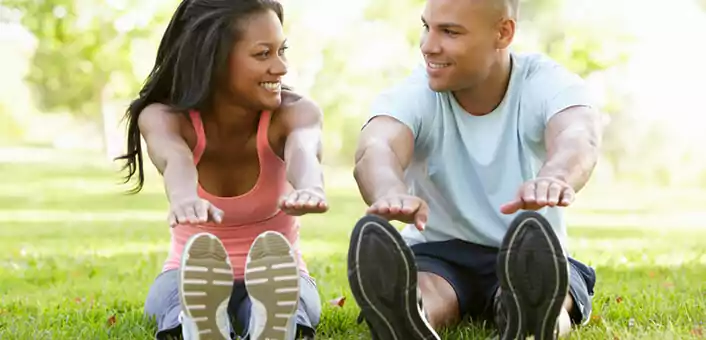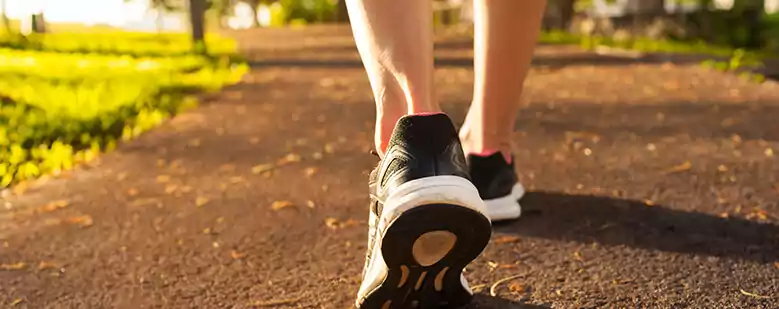
Acid Reflux
Your Exercise Prescription to Reduce Heartburn By 50%
Jun 12, 2017If you suffer from heartburn, also known as acid reflux, you’re not alone. Approximately 60 million people experience it every month, with 15 million adults feeling the unmistakable discomfort of acid indigestion every single day.
You don’t have to suffer through heartburn silently. More and more research is pinpointing how lifestyle habits like exercise can help you to manage this condition. If you’re ready to get your acid reflux under control, it’s time to sweat it out!
Drop the Weight to Drop the Symptoms
Your lower esophageal sphincter (LES) allows food to enter your stomach and keeps stomach acid from coming up into the esophagus where it can create the burning sensation that we all recognize as heartburn.
For most of us, the LES functions perfectly. But if we gain a little extra weight, the extra pressure from this weight gain keeps the LES from opening and closing fast enough. That’s why doctors are highlighting how obesity is one of the most common factors in acid reflux and acid indigestion.
But you don’t have to go on a dramatic weight loss diet to experience relief. According to researchers in the Journal of Gastroenterology and Hepatology, simply losing 10 to 15 pounds can reduce heartburn by 40 per cent!
The research suggests that even if you’re not overweight, weight gain can raise your risks of acid reflux. “Even in subjects with normal body weight,” notes the study, “the risk of heartburn increased with weight gain despite the fact that the body mass index remained in the normal range.”
Losing a couple pounds through exercise is easier than you may think. To lose one pound of weight a week, all you need to do is burn an extra 500 calories per day. The following hour-long activities, calculated for the average 150-pound adult, shows how everyday activities can impact our bottom line:
- Riding a bicycle burns 272 calories
- Playing frisbee burns 204 calories
- Doing housework burns 204 calories
- Playing soccer burns 476 calories
- Going for a casual walk burns 136 calories
- Cleaning up the yard burns 272 calories
Get Strong to Strengthen the Immune System
Helicobacter pylori (H. pylori) is a type of bacteria that affects approximately 66 per cent of adults and infects the lining of your stomach. “Since the rediscovery of Helicobacter pylori two decades ago,” writes scientists in the Current Treatment Options in Gastroenterology journal, “it has become increasingly clear that the true relationships between this organism and diseases of the upper gastrointestinal tract are highly complex.”
It’s been linked to stomach cancer and ulcers, and some suggest that it may influence symptoms of acid reflux.
According to the U.S. National Library of Medicine, exercise is a powerful way to boost the strength of your immune system. It flushes bacteria from your body, activates your white blood cells, reduces stress (stress can increase your risks of getting sick) and raises your body’s temperature to help kill bacteria. Exercise may even help to reduce ulcers related to H. pylori.
You don’t have to be a gym addict to experience the benefits. One study published in the Brain, Behavior, and Immunity journal found immune-boosting benefits after just 20 minutes of exercise.
Your Exercise Prescription
With regular exercise cutting your risks of heartburn in half, you may be lacing up your running shoes as we speak. Not so fast! Exercise is beneficial for managing the symptoms of acid reflux, but the type of exercise matters, too.
Multiple studies have pinpointed what to avoid, and what to incorporate, when it comes to using physical activity to improve your heartburn.
Avoid Vigorous Aerobic Exercise
Thinking of going for a run? Run away from that idea. Vigorous aerobic exercise, such as sprinting and running, agitate heartburn symptoms. The same goes for weight lifting. All that strenuous lifting creates internal pressure within your abdomen, which may affect your LES and its ability to control the flow of food and stomach acid.
The position of your body as you exercise also plays a role. Anything that involves lying flat or bending down may aggravate your heartburn symptoms, since the pull of gravity can affect your LES. Examples include Pilates positions where you bend at the waist, yoga poses on the ground, or even surfing!
Acid reflux was “significantly higher” in surfers versus non-surfers at a ratio of 28 per cent to 7 per cent, reports a surprising study in the Clinical Journal of Sport Medicine. The study says that’s because “paddling in the prone position…increased intra-abdominal pressure and GERD.” This applies to all other exercises where you may be in a prone position.
Look for Gentle, Low-Impact Workouts
Instead of going from zero to 60, consider going from zero to 15. Low-impact exercises carry all the immune-boosting, acid reflux-reducing, weight loss-enhancing benefits without the risks of high-impact, high-speed exercises.
Examples that you may want to consider include:
- Stationary cycling
- Swimming
- Water aerobics
- Walking
- Light jogging
- Upright yoga
- Tai chi
Fueling Your Workouts
Before exercise, many athletes reach for a high-carbohydrate sports drink. That’s a no-no, according to scientists in the World Journal of Gastroenterology. Sports drinks before a workout aggravates acid reflux.
That being said, some of the best foods to fuel your workout and boost you post-exercise recovery are also heartburn-friendly:
- Creamy peanut butter on a bagel or crackers before you exercise.
- Fruit juice or vegetable juice while you exercise. However, avoid citrus juice.
- Vegetables with a side of eggs or lean white meat after you exercise.
Focus on lean proteins and easy-to-digest carbohydrates. Not only do they provide the energy and protein you need to get through your gym routine, but they also are gentle on the digestive system so you don’t cause a flare up of acid reflux. Other exercise- and heartburn-friendly foods include: Focus on lean proteins and easy-to-digest carbohydrates. Not only do they provide the energy and protein you need to get through your gym routine, but they also are gentle on the digestive system so you don’t cause a flare up of acid reflux. Other exercise- and heartburn-friendly foods include:
- Weak tea (the caffeine may help boost your exercise performance)
- Low- or non-fat dairy products
- Tofu
- Broth-based soup
Foods to avoid because they may aggravate heartburn and also reduce your exercise performance include:
- High-fat foods
- Coffee and other high-caffeine drinks
- Alcoholic beverages
- Spicy foods
- Fried foods
Whatever you choose to eat, timing your workout is critical for managing heartburn symptoms. For most people, exercising too soon after eating can aggravate acid reflux. However, everyone’s digestion is different.
To figure out the best time to eat and exercise, time it. Start exercising three hours after eating. Then shorten that window by half an hour the next time you work out. You may find that you need the full three-hour window to digest your food before exercising, or you may find that you’re totally fine having a small snack 30 minutes before going to the gym.
Heartburn Recovery is One Workout Away
More and more people are turning to exercise to manage or reduce their risks of heartburn. Whatever you choose, find a form of exercise that works for your lifestyle, and focus on physical activity that you find enjoyable.
Five recent studies published in the journal Personality and Social Psychology Bulletin discovered that if you choose a form of exercise that you find fun and enjoyable, you’re more likely to stick with it on the long term.
And the more likely you are to stick with your new workout lifestyle, the more you’ll be motivated to find natural, holistic ways to soothe away the stress and pain of acid reflux.
Please consult a functional medicine practitioner for specialized advice if symptoms persist. While research suggests exercise helps, everyone is different and exercise alone may not be adequate in your specific scenario.
References:
https://www.ncbi.nlm.nih.gov/pmc/articles/PMC2886414/
https://www.acefitness.org/fitness-fact-article/2672/trimming-off-the-fat/
https://www.acefitness.org/acefit/healthy_living_tools_content.aspx?id=9
https://medlineplus.gov/helicobacterpyloriinfections.html
https://www.ncbi.nlm.nih.gov/pubmed/14723839
https://medlineplus.gov/ency/article/007165.htm
https://www.ncbi.nlm.nih.gov/pmc/articles/PMC1071012/
https://www.ncbi.nlm.nih.gov/labs/articles/28011264/
https://www.ncbi.nlm.nih.gov/pmc/articles/PMC1774312/
https://www.ncbi.nlm.nih.gov/pubmed/19741311
https://www.acefitness.org/acefit/healthy-living-article/59/2514/what-should-i-eat-before-and-after-my-morning/
https://medlineplus.gov/ency/patientinstructions/000068.htm
https://medlineplus.gov/ency/patientinstructions/000068.htm
https://faculty.chicagobooth.edu/ayelet.fishbach/research/Woolley&FishbachPSPB.pdf






